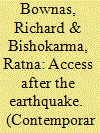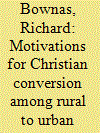| Srl | Item |
| 1 |
ID:
167243


|
|
|
|
|
| Summary/Abstract |
This article examines the aftermath of the Nepal earthquakes of 2015 with special reference to their impact on marginalized communities, in particular Dalit or ‘Untouchable’ communities in Sindhupalchok District, one of the worst affected districts of Nepal. The earthquakes not only took thousands of lives and destroyed property and livelihoods, but their aftermath has revealed the webs of power that shape and limit the opportunities of different communities. Referencing the theoretical approach to access pioneered by (Ribot, J., and N. Peluso. 2003. “A Theory of Access.” Rural Sociology 68 (2): 153–181)the article proceeds to analyze the relative ‘winners and losers’ from the reconstruction process, finding a mixed picture of opportunities and barriers facing the most marginalized communities in the district.
|
|
|
|
|
|
|
|
|
|
|
|
|
|
|
|
| 2 |
ID:
185089


|
|
|
|
|
| Summary/Abstract |
This article explores the rise of Christianity in urban Nepal through the lens of rural to urban migrants and their experiences. As Christianity continues its exponential growth in the Kathmandu Valley, especially among socially and culturally marginalized groups, the article provides theoretical indicators of what is driving the phenomenon. The article explores the motivations for Christian conversion through a comparative methodology: it compares rural-to-urban migrants who converted to Christianity with those who did not and remained Hindu. Interviews with these two groups (conducted from 2018 to 2021) open a window onto the perceived benefits of Christian conversion. The empirical findings are framed through sociological theories of conversion. Interviews show that Christian conversion in urban Nepal is associated with the development of new forms of sociality that assist newcomers to the city adjust to a larger, more anomic environment. Survey findings are supplemented by reports of Christian worship services from various churches in the Kathmandu Valley. The article ends by exploring possible reactions from mainstream Hinduism in Nepal, arguing that Hinduism in Nepal has not yet evolved in the direction of India’s populist hindutva but that among the professional classes personalistic forms of Hindu belief are flourishing.
|
|
|
|
|
|
|
|
|
|
|
|
|
|
|
|